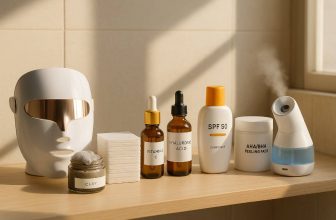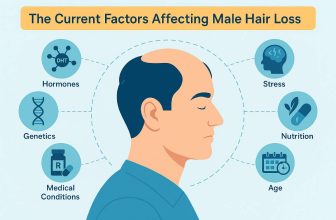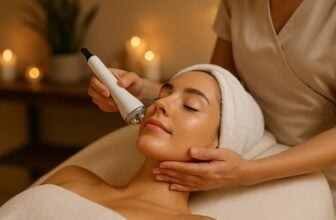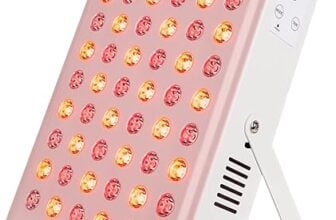As we age, our skin undergoes several natural changes that can affect its appearance and texture. The production of collagen and elastin—proteins responsible for skin’s firmness and elasticity—starts to decline, leading to wrinkles and sagging. Additionally, reduced oil production can result in drier skin, and slower cell turnover may cause a dull complexion.
Maintaining skin health as we age is crucial not just for aesthetic reasons but also for overall well-being. Healthy skin acts as a barrier against environmental damage, and infections, and helps in regulating body temperature. By taking proactive steps, you can support your skin’s health and vitality, ensuring it remains resilient and radiant.
The objective of this post is to provide you with practical and effective tips for revitalizing aging skin. From skincare routines to lifestyle changes, these recommendations are designed to help you achieve a glowing, youthful complexion.
Tip 1: Maintain a Consistent Skincare Routine
Maintaining a consistent skincare routine is the cornerstone of healthy, revitalized skin as we age. This routine should include three essential steps: cleansing, moisturizing, and protecting. Proper cleansing helps remove impurities, dirt, and makeup from the skin’s surface, which is crucial for preventing clogged pores and maintaining a fresh complexion. For aging skin, opt for gentle, hydrating cleansers that clean without stripping the skin of its natural oils.
Moisturizing is equally important, as it helps to keep the skin hydrated and supple. Rich, nourishing moisturizers containing ingredients like hyaluronic acid, glycerin, and ceramides can provide intense hydration and support the skin’s barrier function. Daily application, both morning and night, can significantly improve the skin’s texture and resilience.
Protection from the sun’s harmful UV rays is critical to prevent premature aging and skin damage. Using a broad-spectrum SPF of at least 30 every day, regardless of the weather, can shield your skin from UV radiation. Many modern moisturizers include SPF, making it easier to incorporate sun protection into your daily routine. By adhering to these foundational skincare steps, you can maintain healthier, more youthful-looking skin.
Tip 2: Stay Hydrated
Staying hydrated is essential for maintaining healthy, vibrant skin, especially as we age. Internal hydration helps to keep the skin plump and elastic, reducing the appearance of fine lines and wrinkles. Water is crucial for various bodily functions, including skin cell regeneration and detoxification processes, which contribute to a clear and glowing complexion.
To ensure your body and skin are well-hydrated, aim to drink at least 8 glasses of water a day. This can vary depending on your activity level, climate, and overall health, but keeping a reusable water bottle with you can serve as a reminder to drink throughout the day.
In addition to water, consuming hydrating foods can further support skin health. Fruits like watermelon, strawberries, and cucumbers are high in water content and rich in vitamins and antioxidants. Vegetables like celery, lettuce, and bell peppers can also contribute to your hydration needs while providing essential nutrients. Incorporating these foods into your meals and snacks can enhance your overall hydration and promote a radiant complexion.
Tip 3: Incorporate Anti-Aging Skincare Ingredients
Incorporating anti-aging skincare ingredients into your routine can significantly improve the appearance of aging skin. Among the most effective ingredients are retinoids, vitamin C, and hyaluronic acid, each offering unique benefits to enhance skin health and vitality.
Retinoids, derivatives of vitamin A, are well-known for their ability to promote cell turnover and stimulate collagen production. This helps to reduce the appearance of fine lines, wrinkles, and uneven skin tone. Start by using a retinoid product with a lower concentration to allow your skin to build tolerance, applying it once or twice a week, and gradually increase the frequency as your skin adjusts. To minimize irritation, always apply retinoids at night and follow with a moisturizer.
Vitamin C is a powerful antioxidant that protects the skin from damaging free radicals and environmental stressors. It aids in brightening the skin, reducing hyperpigmentation, and boosting collagen synthesis. Incorporate a vitamin C serum into your morning routine after cleansing and before moisturizing. Be sure to use sunscreen afterward, as vitamin C can make your skin more sensitive to the sun.
Hyaluronic acid is a humectant that attracts and retains moisture, keeping the skin hydrated and plump. It can reduce the visibility of fine lines and create a smoother skin texture. Hyaluronic acid is suitable for all skin types and can be applied both morning and night. Look for serums or moisturizers containing this ingredient to maximize its hydrating benefits.
When introducing these ingredients, it’s important to note that some may cause initial dryness or irritation. Start slowly, observe how your skin reacts, and adjust the frequency of use accordingly. Always patch test new products to ensure they do not cause adverse reactions, and consult a dermatologist if you have sensitive skin or are unsure about combining certain ingredients. By thoughtfully incorporating these powerful anti-aging ingredients, you can achieve a healthier, more youthful complexion.
Tip 4: Adopt a Healthy Diet
Adopting a healthy diet plays a crucial role in maintaining skin health and vitality. What you put into your body reflects on the outside, and a balanced diet rich in essential nutrients can significantly enhance your skin’s appearance and condition.
The Role of Nutrition in Skin Health
Proper nutrition helps to nourish your skin from within, providing the necessary building blocks for collagen production, cell regeneration, and repair. Key nutrients such as vitamins, minerals, and antioxidants combat oxidative stress and inflammation, both of which contribute to premature aging and skin damage. By focusing on a nutrient-dense diet, you can support your skin’s structure and function, promoting a glowing and youthful complexion.
Skin-Boosting Foods
Certain foods are particularly beneficial for skin health due to their high content of skin-loving nutrients:
- Antioxidant-Rich Foods: Blueberries, dark chocolate, and green tea are excellent sources of antioxidants that protect the skin from free radical damage.
- Vitamin C-Rich Foods: Citrus fruits, strawberries, bell peppers, and broccoli are loaded with vitamin C, essential for collagen production and skin firmness.
- Vitamin E-Rich Foods: Nuts, seeds, and spinach provide vitamin E, which helps to shield the skin from UV damage and maintain moisture.
- Omega-3 Fatty Acids: Fatty fish like salmon, chia seeds, and walnuts are rich in omega-3 fatty acids, which reduce inflammation and keep the skin supple.
- Zinc-Rich Foods: Shellfish, legumes, and pumpkin seeds offer zinc, vital for wound healing and controlling oil production.
Reducing Sugar and Processed Foods
To further enhance your skin’s health, it is beneficial to reduce the intake of sugar and processed foods. High sugar consumption can lead to glycation, a process where sugar molecules bind to collagen fibers and make the skin less elastic, leading to wrinkles and sagging. Processed foods often contain unhealthy fats and preservatives that can trigger inflammation and aggravate skin conditions like acne.
By focusing on whole, nutrient-rich foods and minimizing sugars and processed items, you can cultivate a diet that supports robust skin health and fosters a radiant, youthful glow.
Tip 5: Practice Sun Protection
Protecting your skin from the sun’s harmful ultraviolet (UV) rays is essential for preventing premature aging and skin damage. UV exposure can accelerate the aging process, leading to the formation of fine lines, wrinkles, and dark spots. More seriously, it can also increase the risk of skin cancer.
Harmful Effects of UV Exposure
The sun emits UVA and UVB rays, both of which can harm the skin in different ways. UVA rays penetrate deeply into the skin, breaking down collagen and elastin fibers, which are responsible for the skin’s firmness and elasticity. This can lead to sagging and the formation of wrinkles. UVB rays, on the other hand, primarily affect the outer layers of the skin, causing sunburn and contributing to the development of skin cancers. Even on cloudy days, up to 80% of UV rays can reach your skin, making daily protection essential.
Advocate for Wearing Broad-Spectrum Sunscreen
One of the most effective ways to shield your skin from UV damage is by using a broad-spectrum sunscreen that protects against both UVA and UVB rays. Choose a sunscreen with an SPF of at least 30 and apply it generously to all exposed skin, including your face, neck, and hands. Don’t forget often-missed areas like the ears and the back of the neck. Reapply every two hours, or more frequently if you are swimming or sweating.
Additional Sun Protection Measures
In addition to sunscreen, there are several other measures you can take to protect your skin from UV exposure:
- Wear Protective Clothing: Opt for long-sleeved shirts, long pants, and skirts made from tightly woven fabrics to block out the sun. Clothing designed with UPF (Ultraviolet Protection Factor) can offer additional shielding.
- Accessorize with Hats and Sunglasses: A wide-brimmed hat can provide shade for your face, neck, and ears, while sunglasses with UV protection can safeguard your eyes and the fragile skin around them.
- Seek Shade: Whenever possible, stay in the shade, particularly during the sun’s peak hours, typically between 10 a.m. and 4 p.m. Use umbrellas, trees, and other shelters as natural barriers.
- Avoid Tanning Beds: Tanning beds emit UV radiation that can be even more intense than the sun and contribute to skin damage and cancer risk.
By integrating these sun protection strategies into your daily routine, you can significantly reduce the risk of UV-induced skin damage and maintain a healthier, more youthful complexion.
Tip 6: Get Enough Sleep
Getting enough sleep is fundamental for skin repair and regeneration. During sleep, the body goes into recovery mode, and the skin, its largest organ, undergoes crucial processes for renewal. Throughout the night, increased blood flow to the skin delivers oxygen and nutrients that aid in cell repair, collagen production, and overall rejuvenation. Lack of sleep can lead to a dull complexion, dark circles under the eyes, and an overall haggard appearance, as the skin does not have sufficient time to heal and refresh.
The Importance of Quality Sleep
Dermatologists recommend aiming for 7-9 hours of quality sleep each night to support optimal skin health. This duration allows the body to complete multiple sleep cycles, which include stages of deep sleep essential for the production of growth hormones that stimulate cell turnover and new tissue formation. Moreover, adequate sleep helps to balance hydration levels, ensuring that the skin remains moisturized and resilient.
Tips for Improving Sleep Quality
To achieve and maintain quality sleep, consider incorporating the following habits into your nightly routine:
- Maintain a Consistent Sleep Schedule: Go to bed and wake up at the same time every day, even on weekends, to regulate your body’s internal clock.
- Create a Relaxing Bedtime Routine: Engage in calming activities such as reading, gentle stretching, or meditation to signal to your body that it is time to wind down.
- Limit Exposure to Screens: The blue light emitted by smartphones, tablets, and computers can interfere with the production of melatonin, the hormone responsible for sleep. Aim to turn off electronic devices at least an hour before bedtime.
- Ensure a Comfortable Sleep Environment: Make your bedroom conducive to sleep by keeping it dark, cool, and quiet. Consider using blackout curtains, white noise machines, or earplugs if necessary.
- Watch Your Diet and Caffeine Intake: Avoid heavy meals, caffeine, and alcohol close to bedtime, as they can disrupt sleep patterns.
By prioritizing sleep and adopting habits that support restful slumber, you can enhance your skin’s ability to repair and regenerate, leading to a healthier, more vibrant complexion.
Tip 7: Manage Stress
Managing stress is another critical component of maintaining healthy, youthful skin. Chronic stress can have profound effects on the skin, exacerbating issues such as acne, eczema, and psoriasis, while also accelerating the aging process. The body’s response to stress triggers the release of cortisol, a hormone that can disrupt collagen production and compromise the skin’s barrier function, leading to dryness, wrinkles, and other signs of premature aging.
The Connection Between Stress and Skin Aging
Stress-induced cortisol can break down collagen and elastin, the proteins that give skin its firmness and elasticity. Elevated cortisol levels also increase oil production, which can lead to clogged pores and breakouts. Moreover, prolonged stress can impair the skin’s natural ability to repair itself, resulting in a dull and tired complexion. Recognizing the link between stress and skin health is an essential step toward implementing effective stress management techniques.
Stress Management Techniques
To combat the adverse effects of stress on the skin, consider adopting the following strategies:
- Meditation: Incorporating mindfulness meditation into your routine can significantly reduce stress levels. Guided meditations, deep breathing exercises, and progressive muscle relaxation are effective ways to calm the mind and lower cortisol production.
- Exercise: Regular physical activity is a natural stress reliever that increases endorphin levels, which are known as the body’s ‘feel-good’ hormones. Activities like yoga, jogging, or even a brisk walk can help alleviate stress and improve overall skin health.
- Adequate Sleep: Ensuring you get sufficient sleep is crucial for stress management and skin rejuvenation. A well-rested body is better equipped to handle daily stressors and maintain a healthy skin barrier.
- Balanced Diet: Eating a nutrient-rich diet supports overall well-being and can help mitigate the harmful effects of stress. Focus on consuming plenty of fruits, vegetables, lean proteins, and healthy fats.
- Time Management: Organizing your time efficiently can reduce feelings of overwhelm and enhance productivity. Prioritize tasks, set boundaries, and make time for activities you enjoy.
Finding Activities that Relax and Rejuvenate
Everyone has unique methods of relaxation and rejuvenation. It’s important to discover what works best for you:
- Engage in Hobbies: Whether it’s painting, gardening, or playing a musical instrument, engaging in activities you love can significantly lower stress levels.
- Spend Time in Nature: Nature has a calming effect on the mind and body. Consider spending time outdoors, whether it’s a hike in the woods or a walk in a local park.
- Social Connections: Building and maintaining strong social connections can provide emotional support and reduce feelings of stress. Make time for friends and family, or join a community group to expand your social network.
- Self-Care Rituals: Incorporating self-care practices, such as taking a warm bath, reading a book, or pampering your skin with a facial mask, can provide much-needed relaxation.
By integrating these stress management techniques into your daily routine, you can enhance your skin’s resilience and maintain a youthful, healthy complexion.
Conclusion
Recap of Top Tips for Revitalizing Aging Skin
Revitalizing aging skin requires a multi-faceted approach that incorporates several key habits into your lifestyle. Here’s a recap of the top tips discussed:
- Prioritize Quality Sleep: Aim for 7-9 hours of restful sleep each night to support skin repair and regeneration.
- Manage Stress Effectively: Utilize stress management techniques like meditation, exercise, and engaging in hobbies to reduce cortisol levels and protect your skin’s health.
- Follow a Consistent Skincare Routine: Use products suited to your skin type and age, focusing on cleansing, moisturizing, and protecting with sunscreen.
- Stay Hydrated: Drink plenty of water daily to maintain skin’s hydration and elasticity.
- Consume a Balanced Diet: Focus on nutrient-rich foods, including fruits, vegetables, lean proteins, and healthy fats, to provide essential vitamins and antioxidants for your skin.
- Avoid Smoking and Limit Alcohol: Both can dehydrate and damage your skin, leading to premature aging.
- Exercise Regularly: Physical activity increases blood flow, promoting a healthy complexion.
- Protect from Environmental Damage: Shield your skin from pollutants and use products containing antioxidants to combat free radicals.
Encouragement and Inspiration
Implementing these habits consistently can significantly improve your skin’s appearance and health. Remember, positive changes take time and persistence, but the rewards are well worth the effort. By prioritizing sleep, managing stress, maintaining a balanced diet, and caring for your skin daily, you are investing in a more youthful, vibrant complexion. Embrace these self-care practices with confidence, knowing that each step brings you closer to achieving glowing, resilient skin. Take action today, and let the transformation begin!
Frequently Asked Questions
Q: How long does it take to see results from a new skincare routine?
A: Results can vary depending on the individual and the specific products used. Generally, it can take about 4 to 6 weeks of consistent use to notice the initial improvements. For more significant changes, it may take several months.
Q: Can stress really affect my skin that much?
A: Yes, stress can significantly impact your skin by increasing cortisol levels, which can lead to breakouts, dryness, and premature aging. Managing stress effectively is crucial for maintaining healthy skin.
Q: What are the most important steps in a skincare routine for aging skin?
A: The most important steps include cleansing, moisturizing, applying sunscreen, and using targeted treatments like serums or creams with anti-aging ingredients such as retinol, hyaluronic acid, and antioxidants.
Q: How much water should I drink for better skin?
A: It’s recommended to drink at least 8 glasses (about 2 liters) of water a day to help keep your skin hydrated and support overall health.
Q: Are natural remedies effective for skin aging?
A: Natural remedies can be effective, especially when combined with a balanced diet and proper skincare routine. Ingredients like aloe vera, honey, and coconut oil have beneficial properties, but it’s essential to ensure they are suitable for your skin type.
Q: Is it necessary to use anti-aging products in my 20s?
A: While your early 20s might be too soon for strong anti-aging products, using sunscreen daily, staying hydrated, and maintaining a simple, effective skincare routine can help prevent early signs of aging.
Q: Can diet really affect my skin’s appearance?
A: Absolutely. A nutrient-rich diet supports skin health by providing essential vitamins and antioxidants. Foods rich in vitamins C and E, omega-3 fatty acids, and zinc can particularly benefit your skin.
Q: How often should I exfoliate my skin?
A: Exfoliation should be done 1-3 times a week, depending on your skin type. Over-exfoliating can lead to irritation and damage, so it’s crucial to find a balance that works for your skin.
Q: What is the role of sunscreen in anti-aging?
A: Sunscreen is one of the most effective anti-aging products as it protects your skin from harmful UV rays, which can cause wrinkles, and sunspots, and increase the risk of skin cancer. Use a broad-spectrum sunscreen with at least SPF 30 daily.
Q: Can smoking impact my skin’s appearance?
A: Yes, smoking can accelerate the aging process of your skin, causing wrinkles, dryness, and a dull complexion. It restricts blood flow and depletes essential nutrients, negatively affecting skin health.





